Meet the cows, goats, bees, and farmers who are making it happen
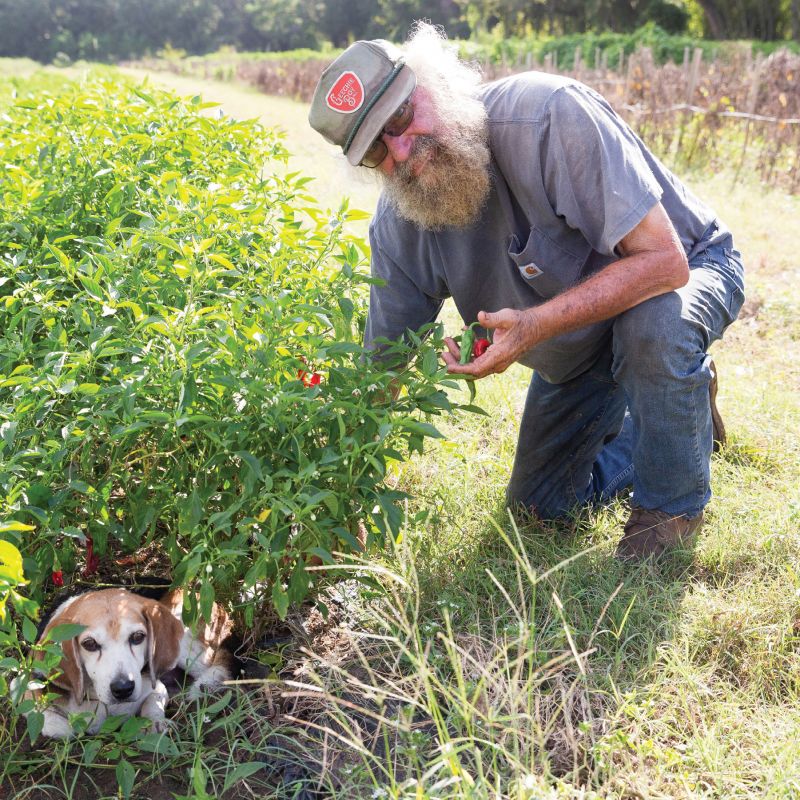
The eagles swoop and soar over the water’s edge, presiding over the vast beauty of their home along the Kiawah River. For 20-plus years, two bald eagle families have nested here and hunted the river, creeks, ponds, marshes, and farmland that comprise these 2,200 acres on John’s Island. From their winged surveillance of this rural sea island landscape, the eagles have undoubtedly witnessed much change—new golf courses and resort developments nearby, more homes, more traffic, less farmland.
Today, the eagles hunting over the Kiawah River development, along with the owls, roseate spoonbills, and plethora of other wildlife, are witnessing a small reversal of that trend. In lieu of another golf-centric gated neighborhood, The Beach Company is creating the Lowcountry’s first “agrihood”—a growing national trend in which a working farm is the centerpiece of a residential development.
Sidi Limehouse isn’t exactly an eagle, but he does have a similarly dominant wingspan in the local agricultural community. And he, too, has seen plenty of change on this land, these fields that he has traversed, time and again, on tractors or in his old red Ford F-150 (its dashboard a dust-caked depository of receipts, yellowed phone directories, and who knows what).
“I’m one of the last Mohicans,” says the born-and-bred John’s Islander whose father bought Mullet Hall Plantation, the land on which Kiawah River sits, in 1938, the year Sidi was born. “I’m 82 years young,” he adds, his craggy hands as dirt-worn and farm-rugged as his topographic face, “and I plan to keep farming another 10 years, as long as I can still crawl up on that tractor.”
As the head of Rosebank Farms, Limehouse is among the most respected farmers in the state. In 2019, he was named the Swisher Sweets/Sunbelt Expo South Carolina Farmer of the Year, and in 2018 he received the Coastal Conservation League’s Jane Elizabeth Lareau Environmental Stewardship Award. In 2015, Rosebank Farms was recognized as the Charleston County Soil and Water Conservation District’s Conservationist of the Year. But his most coveted accolade might be rabble-rouser: to wit, as founder of Friends of the Kiawah River, he has been dogged in opposing plans to develop Captain Sams Spit.
Given his outspoken conservation ethic and fierce protection of his beloved sea island, you might expect Limehouse to resist the Kiawah River development, where 100 acres of dedicated farmland will be adjoined by a 1,000-home residential component that will eventually include a swim club, wedding chapel, riverfront restaurant, and 20 miles of wildlife trails. Instead, he’s an enthusiastic participant.
“I’m against development, but I’ve got enough sense to know it’s coming, so I want to make sure it’s done right,” says Limehouse, who sold the land to The Beach Company in 1995, retaining farming rights to a portion of it. “What they’re doing at Kiawah River Farm is as good as I could hope for. It’s certainly keeping the John’s Island agricultural heritage going. It’s a concept I’m glad to help.”
The Beach Company’s aim is to make farming a key feature of the Kiawah River development. Limehouse is one of a select group of farmers who “leases” farmland rent-free in exchange for agreeing to sustainable farming practices that maintain the health of the land and Kiawah River ecosystem. The farmers also participate in the Kiawah River CSA (Community Supported Agriculture) program, but are free to sell their produce and products in other markets as well.
Limehouse is joined by his longtime colleagues and neighbors, the Freeman family of Freeman Farms, in growing vegetables on the Kiawah River Farm. Like Limehouse, the Freemans have deep roots here as fourth-generation farmers. Brothers Oliver, Ike, and Earl, all in their 70s, are joined by 25-year-old A.J. in growing an array of crops on their 50-acre Kiawah River Farm parcel. (Both the Freemans and Limehouse farm additional John’s Island land as well.)
“I’ve known Sidi all my life. I like having people I know working close by,” says the younger Freeman. “Keeping a farm here is a great model for other developers,” he agrees. “The land is pretty fertile. We’re seeing great results.”
Among the produce that Limehouse and the Freemans are planting and harvesting on their Kiawah Island Farm acreage are peppers, tomatoes, kale, seasonal greens, beans, squash, and watermelon, as well as Rosebank Farms’ cut flowers. Whatever is in season each week gets distributed to Kiawah River residents who purchase a share in the agrihood’s weekly CSA delivery—a perk of living in a farm-to-table neighborhood.
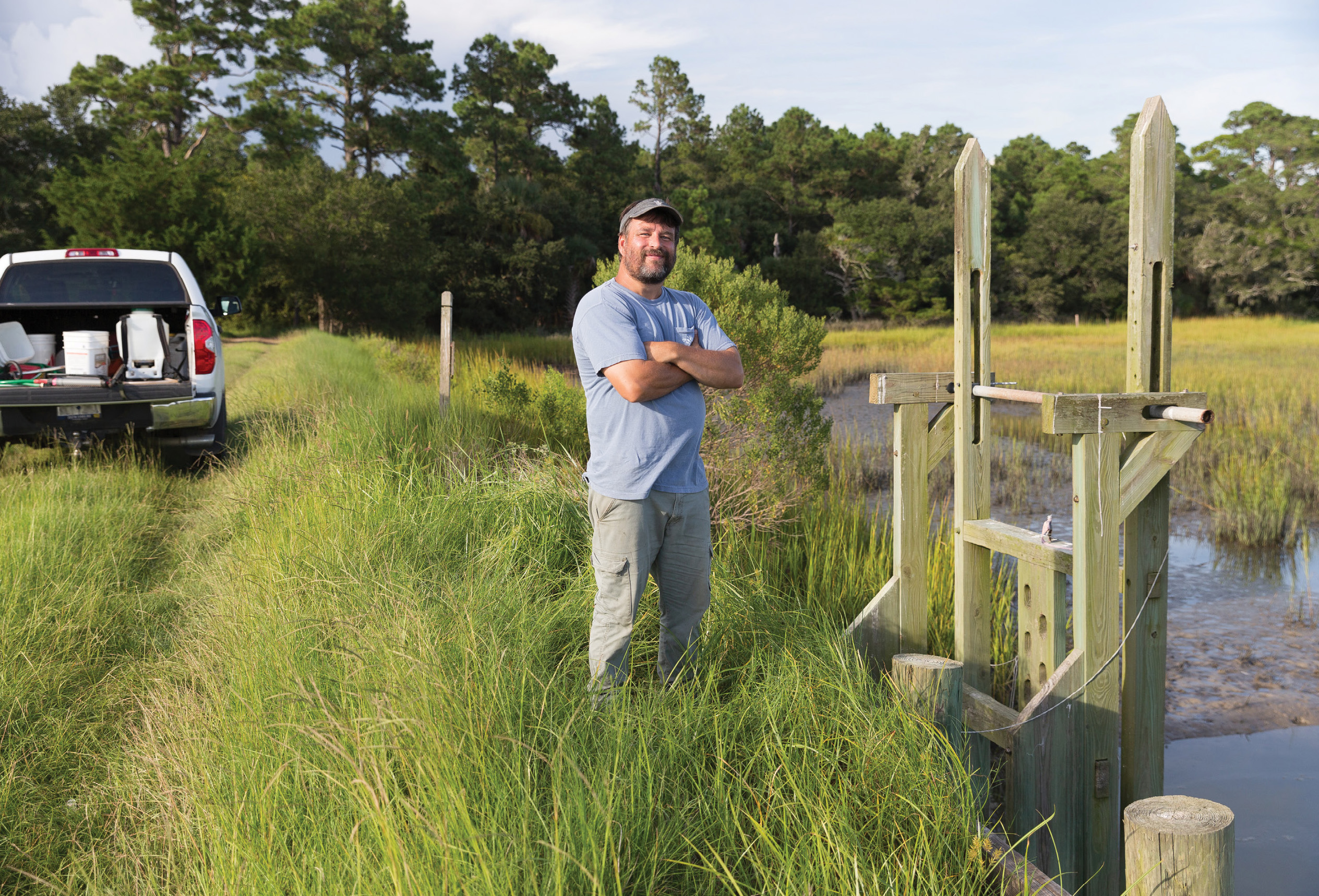
The Steward: Jeff Snyder, a biologist, knows every nook, creek, and cranny of these 2,200 acres. He has lived on-site and managed the land after the Beach Company bought it in 1995, building rice trunks to enhance water features for the property’s abundant wildlife.
Environmental Stewardship
“Agrihoods offer proven financial, health, and environmental benefits—to the stakeholders involved in their implementation, to surrounding communities, and to the planet,” notes the Urban Land Institute, a national nonprofit that supports responsible and sustainable land use.
The sustainability factor is the driving force behind the Kiawah River Farm concept, explains Jeff Snyder, chief environmental officer with The Beach Company. “We’ve had an environmental stewardship vision for this land since purchasing it in 1995,” he says.
A biologist, Snyder has lived on and managed this land for most of the past 20 years, teaching his son to fish and hunt out here. He has installed rice trunks to manage fresh and saltwater flow; planted and maintained tree nurseries of various hardwood oaks, cypresses, magnolias, and loblolly pines; and made numerous improvements to enhance wildlife habitat. He knows where the eagle families nest, where the best redfish hole is, where the wildflowers thrive. And he knows the local farmers.
By developing relationships and trust over time, Snyder has curated a team of legacy farmers, as well as newcomers who share his vision for an ecologically sustainable development—one in which the land’s productivity not only reflects and honors its historical use but adds to its future health.
For start-up goat farmers Danny Sillivant and Missy Farkouh, the arrangement has been a godsend. And in terms of the goats, it works well for Snyder, too; he knew exactly what he was doing in giving The Goatery and its friendly, spry little herd the most visible spot along the pastoral drive into Kiawah River—call it the rural version of curb appeal. Handsome Belted Galloway cattle also graze nearby, turning heads as drivers pass by.
Indeed, The Goatery’s cute factor is undeniable. The goats’ sweet faces; the curious eyes with their horizontal dash of a pupil; the goofy, cartoonish mouths in perpetual motion. Sillivant fell hard for the adorable kids and their gentle mamas when he volunteered to help a chef friend milk goats a few years ago, during a low spell while he was recovering from cancer treatment. “I fell in love with them right then,” says Sillivant, who kept returning to assist with milking, and despite being a real estate guy with zero background in animal husbandry, eventually adopted the herd. His Goatery business partner, Missy Farkouh, was similarly smitten. “I showed up to a goat yoga class, and never left,” she says. “Now they’re my ‘farmily.’”
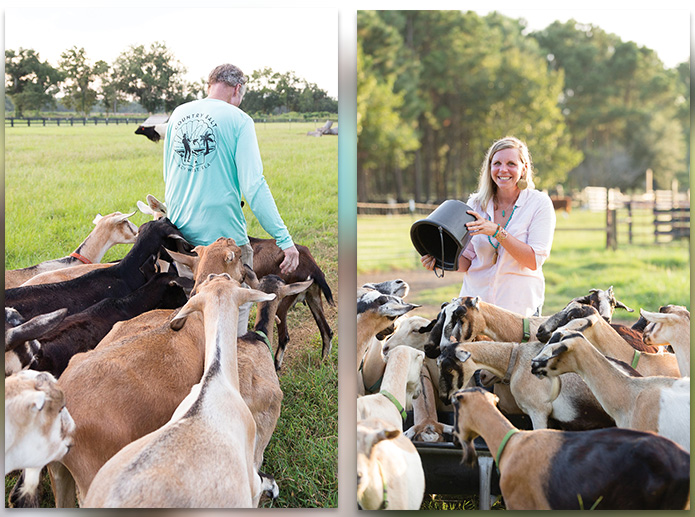
Kidding Around: Danny Sillivant leads the herd that stole his heart and led him to shift from a career in real estate to goat farming. The Goatery welcomes visitors to meet and mingle with their friendly livestock. Downward Facing Goat: Missy Farkouh was lured into goat farming thanks to goat yoga (occasionally offered at The Goatery). As Sillivant’s business partner, she’s become conversant in all things animal husbandry, from veterinary care to cheese making
Sillivant and Farkouh start early in the morning to do a wellness check on each of their 90-some goats, a specialty mix of Nubian, Alpine, and Lamancha breeds. “Goats are desert animals,” explains Farkouh. “It’s an ongoing science to adapt them to this humid, wet environment.” Like all Kiawah River Farm partners, Sillivant and Farkouh are committed to holistic and humane farming practices, which, they say, result in a better tasting and better-for-you dairy product, prized by local chefs. “About 90 percent of the goat cheese found in downtown establishments is from us,” notes Farkouh. Their cheese production has been on hiatus while she and Sillivant upgrade their dairy facility with a new, high-tech converted shipping container, which will allow them to produce a greater variety of cheeses and cosmetic products.
Kiawah Farm families can bike over and interact with the herd and meet Priscilla and Hefe, two miniature donkeys who are perimeter herders to protect against coyotes and foxes. “They’re pretty cute, but a donk can be vicious if a predator threatens,” says Farkouh. Equally cute are the scruffy, brindled KuneKune pigs, who revel in the dirty duty of eating goat feces.
A Whole World Happening
So every member of the “farmily” here plays a role: the donks protect the goats; the pigs keep the farm clean and reduce risk from horn flies and other potentially harmful pests; the goats help Snyder clear underbrush in other areas of the development. Meanwhile, bees from the adjacent Kiawah Farm apiary pollinate the cover crop, grasses, and flowers that help feed the goats, and the bees’ honey in turn sweetens the goat cheese.
“There’s a whole world happening out here, all working together,” says Farkouh. “It’s the science of ‘refugia,’ the science of not trying to control nature but letting nature take its role when there’s a holistic, harmonious balance among diverse plant and animal species.” Each makes the other stronger and healthier, she explains, and that balance includes the human neighbors, whose health and well-being is improved by eating fresh, local food. And, of course, by playing with the goats. “Your heart rate goes down, and your happiness factor rises around them,” says Farkouh. “It’s inevitable.”
On the other hand, the 50,000-some buzzing Kiawah River beehive residents might make heart rates go up, but they, too, are an integral player in the Kiawah River ecosystem, explains beekeeper Chuck Hudspeth. As pollinators, they ensure the health and sustainability of crops and flowers, and of other uncultivated plant habitats that serve as food and shelter for creatures large and small. Honey is the sweet payoff. Some 15 gallons is harvested annually from the five hives.
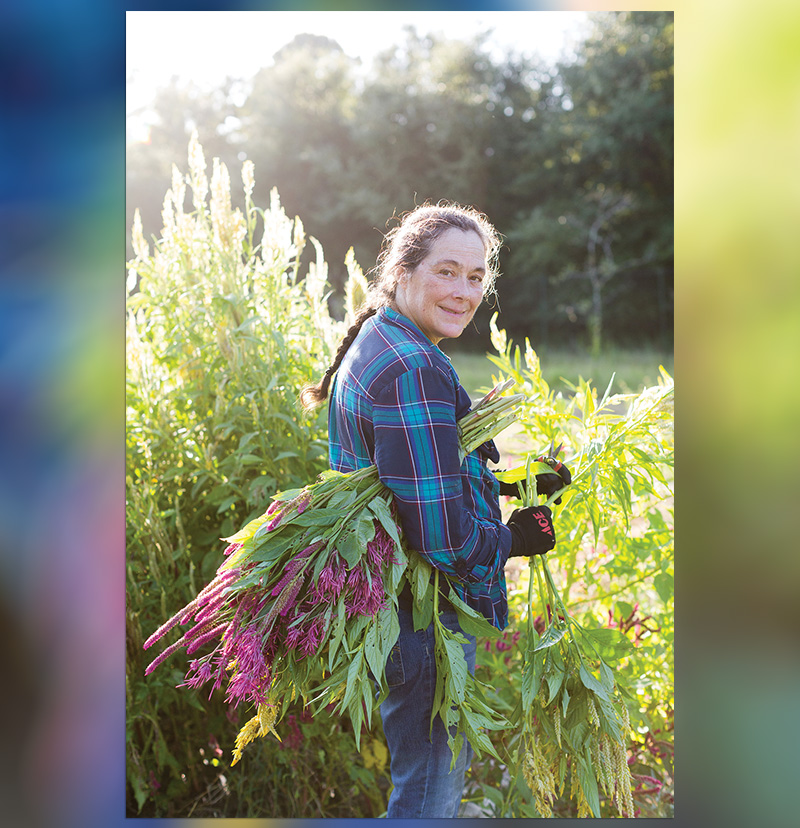
In Bloom: Jana Mendenhall was an experienced organic farmer in California before moving east and now grows an array of flowers—a favorite nectar source for Hudspeth’s nearby apiary.
Hudspeth’s Kiawah River honey reflects a unique sweet flavor profile of marsh-friendly blossoms, vegetables, and the fields of flowers grown by Jana Mendenhall of Bohicket Blooms, Kiawah River’s cut-flower farm. Mendenhall recently relocated to John’s Island from California, where she was an organic flower farmer, and was looking for affordable land to cultivate when she met Snyder.
“This is a great vision of community agriculture,” says Mendenhall, who includes Mason jar bouquets in the neighborhood’s CSA. “In California and here, I’ve seen the paradigm shift from big old-school farms to smaller ones. Kiawah River Farm is a strong collaborative effort. They’re providing a unique opportunity for small farmers like me.”
Neighboring egg farmer Jeremy Storey is similarly a John’s Island transplant who appreciates the camaraderie he’s found in the agrihood. Before moving to South Carolina, Storey was a chef at the three-Michelin-star Chicago restaurant Alinea. He had every reason to feel at the top of his game, but instead he was restless. “It was taking a toll. I wasn’t happy and kept wondering what else I could do related to the food industry that would be more satisfying,” he recalls. An article about pheasant farming sparked an idea: he could provide quality food to restaurants.
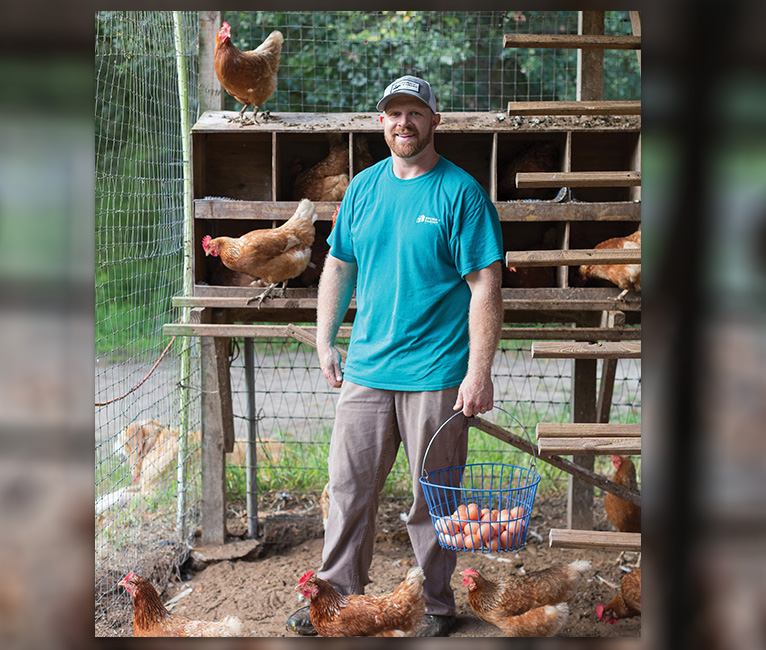
Jeremy Storey of Stoney Farms
A Chicken-and-Egg Thing
In 2014, Storey and his wife moved to Charleston, where he found work cooking at The Ocean Room while starting small with hobby farming. As he got a better feel for the area and the farm-to-table scene, he discovered a dearth of quality eggs. At the time, Celeste and George Albers were getting out of egg production, so Storey acquired their chickens, as well as 200 chickens that Sidi Limehouse was looking to off-load. Today, Storey Farms has some 3,000 free-range egg-laying hens, about 1,500 meat-producing chickens seasonally, and a few hogs. Currently located across Betsy Kerrison Parkway from Kiawah River Farm, Storey includes his eggs in the neighborhood CSA and has plans to expand his operation on-site.
“I’m fully behind the Kiawah River Farm concept,” says Storey, who feeds The Goatery milk to his meat-producing chickens, to the delight of area chefs (and the chickens, “they love it.”) Like Limehouse, the Freemans, and others, he’s a proponent of keeping John’s Island rural, “but if land is going to be developed, then keeping a huge section of it agricultural is the way to do it,” he says. As a chef, he knows good food begins with quality ingredients, and in turn, good food and quality restaurants add to a community. You know—a chicken-and-egg thing. The goal, Storey says, “is to create a good connection with the local community and give people a deeper knowledge of where their food comes from.”
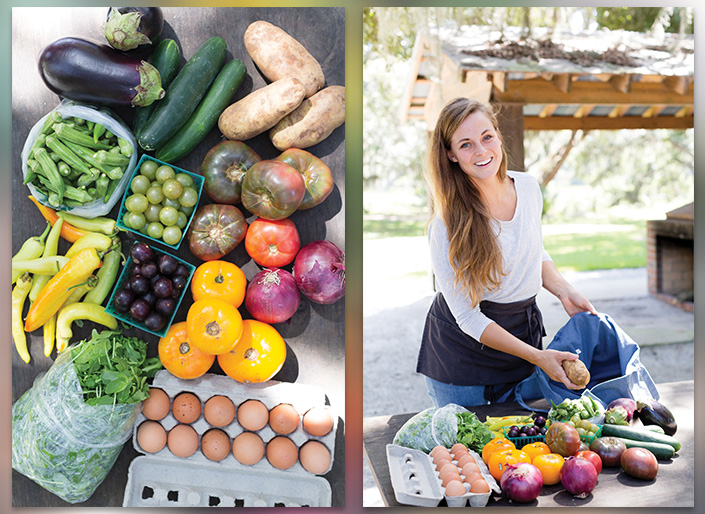
To Market: Candice Broyles manages the neighborhood’s CSA program, for which property owners and other local neighbors can pay for seasonal or weekly shares. Bags full of freshly harvested produce and eggs are delivered every Wednesday.
Bohicket Blooms: Flower farmer Jana Mendenhall grows an array of specialty cut-flower varieties. bohicketblooms.com
Freeman Farms: A four-generation family farm growing a wide variety of vegetables, including kale, collards, tomatoes, and fruit on 50 acres at Kiawah River, as well as additional acreage on John’s Island.
Kiawah River Beehives: Beekeeper Chuck Hudspeth maintains five hives, each housing up to 50,000 bees, resulting in honey that tastes like summertime year-round.
Rosebank Farms: Sidi Limehouse and his team harvest an assortment of produce, such as carrots, lettuce, cabbage, okra, watermelon, artichokes, and heirloom tomatoes, as well as Rosebank’s prized seasonal flowers, including zinnias and hydrangeas. rosebankfarms.com
Storey Farms: This small John’s Island farm specializes in ethically raised and harvested chicken eggs, free-range chicken meat, and pasture-raised pork. facebook.com/storeyfarms
The Goatery: An artisan goat dairy producing high-quality, handmade goat cheese, The Goatery is also a sanctuary, providing their herd with a forever home and a welcoming place where visitors can meet the animals, volunteer, and practice goat yoga. thegoateryatkiawahriver.com
Three Gates Cattle Company: Organic Belted Galloway beef cattle are grass-fed on 18 acres of shaded, creekside pasture and given the highest possible standard of care in accordance with the Global Animal Partnership’s Five-Step Animal Welfare Rating. threegatescattlecompany.com